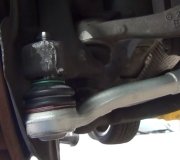I would wait for now, plus I think you should get a second opinion from a tire and alignment shop. Since we don't know how they arrived at the diagnosis in the absence of symptoms, they might just be preparing you for future service needs so they don't come as a shock.
To check for leakage at the rack and pinion steering gear assembly, clamps must be removed so the protective boots can be pulled back. That is a lot of work and is never done just for preventive maintenance. When the power steering fluid has to be filled repeatedly, and no obvious leaks can be found, THAT's when they will look at those boots, but they just pry the ends open a little to see if fluid comes pouring out. I have a feeling they based their diagnosis on the observation that they had to add a little power steering fluid to the reservoir. That in itself is not terribly unusual. If the fluid level does not go down, don't worry about the rack and pinion.
The outer tie rod ends attach to the rack and pinion assembly. They push and pull on the wheels to turn them left and right. Some cars, Fords for example, have a huge problem with them coming apart and causing crashes, but that is not so common on other brands of cars. What WILL happen when there is looseness in one of them is that tire will be able to turn a very small amount left and right as you are driving straight. That leads to tire wear problems on both front tires. The connection between the outer tie rod and inner tie rod, (part of the rack and pinion steering gear assembly), is one of the alignment adjustments that must be set very precisely to reduce tire wear. A loose tie rod should not be ignored. If your mechanic is not advising you to have it replaced right now, that suggests it isn't really that bad yet. You can check them yourself by grabbing each tire by the 3:00 and 9:00 clock positions and trying to turn it quickly and repeatedly left and right. It should feel tight. Do this with the steering wheel unlocked. If you leave the steering wheel locked, you will feel the clunking of the lock mechanism as you tug on the tire. With the steering wheel unlocked, it's that same feeling you're looking for. If you feel a clunking, you'll need a helper so one of you can watch to see if the looseness is in the inner or outer tie rod.
Learning what a loose tie rod feels like is easier if someone has one they can show you. They are much easier to find too if the tires are jacked up off the ground. Most mechanics have a habit of checking each side of the car when they have it up on a hoist. It takes just a couple of seconds as they are walking by it.
In the 1980s I replaced so many outer tie rods on Ford Escorts and Tempos, I could do them in less than five minutes without even removing the wheels. Normal cars however take longer, plus the car will need an alignment to set that new tie rod correctly. Parts, labor, and alignment can run around $150.00.
$550.00 to replace the rack and pinion assembly is not outrageous. That would be for a rebuilt assembly which is what is normally used. New racks cost about that much without factoring in labor and the alignment. Replacing them can be a miserable time-consuming job such as on GM cars, or it can be done on some in a few minutes such as on some older Chrysler products. This job also requires an alignment. If you DO need to have both parts replaced, it will be less expensive to have them both done at the same time. That way one alignment will be all that's needed.
Tuesday, June 7th, 2011 AT 1:27 AM



